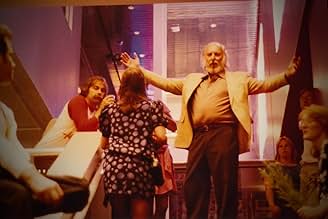Tower Records - Nascita e caduta di un mito
Aggiungi una trama nella tua lingua'All Things Must Pass' is a documentary that explores the rise and fall of Tower Records, and its legacy forged by its rebellious founder, Russ Solomon.'All Things Must Pass' is a documentary that explores the rise and fall of Tower Records, and its legacy forged by its rebellious founder, Russ Solomon.'All Things Must Pass' is a documentary that explores the rise and fall of Tower Records, and its legacy forged by its rebellious founder, Russ Solomon.
- Regia
- Sceneggiatura
- Star
- Self - Singer-Songwriter
- (as Sir Elton John)
- Self - Russ's Wife
- (as Patti Drosins-Solomon)
Recensioni in evidenza
There was something quite special about that feeling of visiting an actual existing recordstore, which simple can not be experienced by simply downloading A TRACK.Going to the record store, with all these zillion records stacked up high, gave a feeling of coming home. And it was a home, for many music lovers AND musicians for many many years.
Internet killed the record store though after 2000. But the record store miraculously DID SURVIVE in Japan, of all places!
A bit too many management talking heads are the only downside of this documentary. For that reason I skipped the middle part. But the first part of the origin and rise to fame of Tower Records and the last part about the downfall are pretty interesting and fun to watch.
Colin Hanks does an outstanding job of showing the progression of Tower Records from initially a Sacramento pharmacy selling 45's to an international record giant and the vision of Russ Solomon and his team of loyalists . Russ is portrayed as an all around good guy who enjoyed nurturing employees to find their strength and grow with the company. I loved the interviews with the employees and recording artists who loved the place. Unfortunately digital music and the death of the CD killed the stores . But Russ was not bitter and had a great attitude. Glad this was filmed before he died so we could get his perspective. An excellently paced documentary.
Actor, Collin Hanks directs this documentary of the rise and fall of an important landmark in music history, from behind the scenes (as we all are most likely familiar with the surface of the story (especially it's end).
The interviews and narrative take me back to the days when you could not download a single, and had to go into a store to buy an album. Watching footage of rows and rows of albums and CDs fills me with the memories.
And the documentary truly points out what an interesting place Tower Records was and how interesting the people who worked there are, as they talk to people who were either there from the beginning or started out as a stock clerk at the original store and worked their way up to VP of something. It felt like the cool place you wish you had a job at.
Especially if Foo Fighters front man Dave Grohl was a fellow Stock Clerk. He and Bruce Springstein and Sir Elton John told about their personal experiences at the store and showed their love for it.
It seems so recent, but Tower Records is now just a part of music history. This doc did a good job of showing that history from beginning to end.
With humble beginnings as little more than a lark, Tower Records began when Russ Solomon's dad decided to sell used 45 rpm singles in his cramped Sacramento drug store. He bought the singles for 3 cents and sold them for 10 cents. Within a few years, Russ purchased the record business from his dad, and proceeded to run it as only a rebellious kid from the 1960's could. From 1960 through 2000, the business grew each year. It expanded the number of stores (peaking at 192 worldwide) and constantly adjusted to the musical tastes and the delivery method – 45's, LP's, cassettes, CD's, etc.
Using some terrific photographs and video clips, accompanied by spot on music selections, director Hanks brilliantly and generously allows the actual players to tell the story. The expected celebrity drops are present, and even the words of David Geffen, Dave Grohl, Bruce Springsteen and Sir Elton John carry emotion. However, far and away the most impact comes from extended interviews with the unconventional and charismatic Tower Records founder Russ Solomon and his devoted and forthright employee team. Their sincere recollections provide the roadmap through the phenomenal growth, as well as the devastating end in 2006. We understand how these stores became so much more than retail outlets they were cultural hotspots for at least two generations. We also learn some things we probably shouldn't like the definition of "hand truck fuel", and the reason Russ installed hot lighting in the listening booths.
Mr. Hanks surprises with his ability to balance nostalgia and the harsh realities of the downfall of an iconic cultural business. The film captures the key role Tower Records, while also pointing out that the crash was due to more than just Napster and digital music delivery. An interesting case study for business majors highlights the importance of vision vs debt. For more insight from Colin Hanks, check out the interview from film critic Chase Whale: http://www.hammertonail.com/
"No Music. No Life". The motto of Tower Records was somehow inspirational, and fit perfectly for stores that featured mammoth album artwork on their store fronts, their own "Pulse" magazine, and staff that couldn't fathom life without music much less wearing a suit and tie to work. This was truly "a chain of independent stores", and trust me when I tell you that hanging out at Tower Records was more fun than having hundreds of cable channels.
Lo sapevi?
- QuizTo promote the release of the film, the still empty building which once housed the Tower Records on Sunset Blvd. in West Hollywood had its facade repainted to appear as it once had. This led to rumors that the store may reopen, but in fact the building had been sold to Gibson Guitars in 2014 with the intention of opening a guitar showroom, while preserving the historic building itself. Not yet ready to open their showroom, Gibson worked with the documentary makers to repaint the building to display the Tower facade. The repaint was planned to be taken down after the premiere party was held inside the empty building, but remained up for over a year while Gibson continued to plan their new store.
- BlooperIn the closing credits the Japanese Translator, Kyoko Nishijima, is listed twice.
- Citazioni
Dave Grohl, Himself: [Describing the cover of Nirvana's "Nevermind" LP] People went to great lengths. Like they'd get that weird foam and cardboard stuff and make a baby and there's a actual dollar bill dangling in front of it and it looks like water behind it. And, you know, when you would see people go to that much trouble for you, for your band, we were just, like, we were just shocked.
I più visti
- How long is All Things Must Pass?Powered by Alexa
Dettagli
- Data di uscita
- Paesi di origine
- Siti ufficiali
- Lingua
- Celebre anche come
- All Things Must Pass
- Luoghi delle riprese
- 8801 Sunset Blvd West Hollywood, California, Stati Uniti(Tower Records Sunset Blvd. location)
- Aziende produttrici
- Vedi altri crediti dell’azienda su IMDbPro
Botteghino
- Lordo Stati Uniti e Canada
- 172.394 USD
- Fine settimana di apertura Stati Uniti e Canada
- 19.001 USD
- 18 ott 2015
- Lordo in tutto il mondo
- 172.394 USD
- Tempo di esecuzione1 ora 34 minuti
- Colore
- Proporzioni
- 1.78 : 1
Contribuisci a questa pagina




























